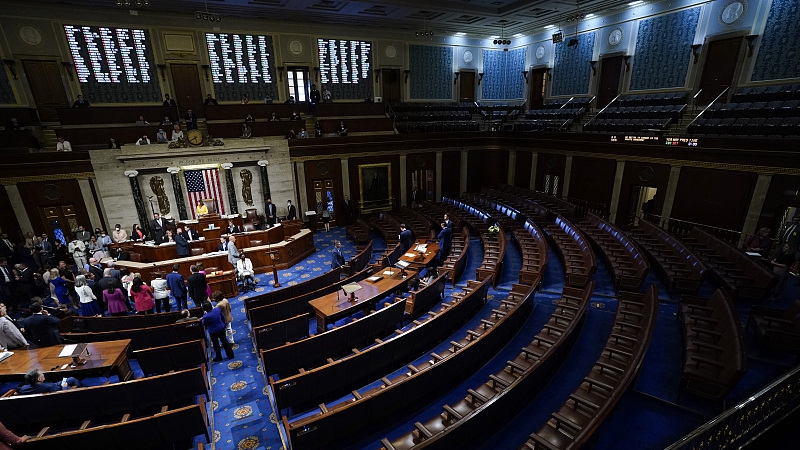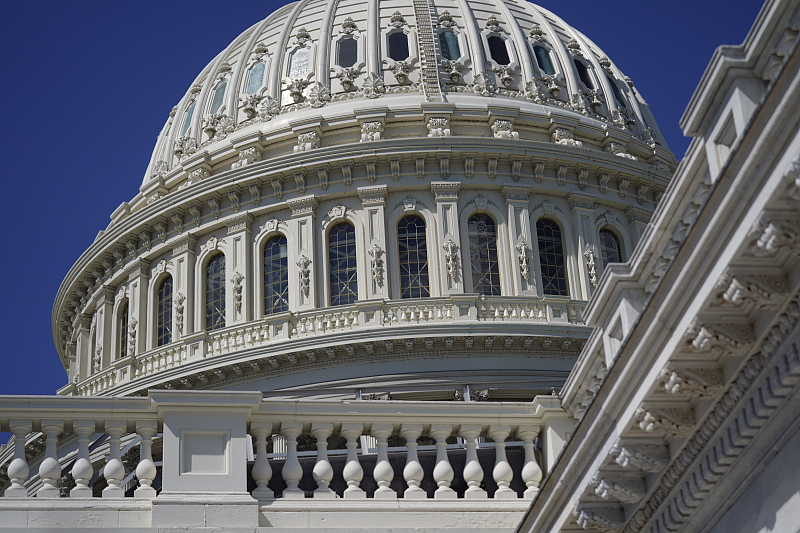
U.S. House Speaker Nancy Pelosi finishes the vote to approve the Inflation Reduction Act in the House chamber at the Capitol in Washington, August 12, 2022. /CFP
U.S. House Speaker Nancy Pelosi finishes the vote to approve the Inflation Reduction Act in the House chamber at the Capitol in Washington, August 12, 2022. /CFP
Editor's note: Yuan Sha is an assistant research fellow in the Department of American Studies at the China Institute of International Studies. The article reflects the author's opinions and not necessarily the views of CGTN.
The passage of the Inflation Reduction Act (IRA) of 2022 in both Chambers of Congress handed a major legislative victory to U.S. President Biden, who will soon sign the bill into law.
The approximately $700 billion IRA, which is redesigned in order to push through Congress ahead of the November mid-term election, is a watered-down version of the Biden's signature $3 trillion Build Back Better Act. The effectiveness of the bill on curbing inflation and the election result still remains to be seen.
Limited help for easing U.S.'s inflation
The title of the bill, Inflation Reduction Act, is somewhat misleading as the bill is in fact about climate, healthcare and tax. Specifically, the bill intends to invest around $370 billion in combating climate change and promoting energy reform, which would be the largest federal investment on clean energy in U.S. history.
Besides, the IRA also aims at reducing healthcare costs, including a historic measure that allows the federal health secretary to negotiate the drug prices for Medicare. The bill also proposes a 15 percent minimum tax for corporations making $1 billion or more in profit, which is estimated to create over $300 billion in tax revenue and be used to cover the costs of the increased spending on climate and healthcare.
The bill is repackaged and renamed to cater to the rising public concern of the runaway inflation in the U.S., which is at the highest level in the past four decades. Democrats portrayed the bill as a cure to inflation by lowering energy and healthcare costs for families and by helping to bring down the deficit. But how much and how soon the bill would be effective in terms of handling inflation is uncertain.
After all, the bill is not addressing the root cause of the U.S. inflation, which is the skyrocketing government spending since the COVID-19 pandemic. The Biden administration has flooded money into the market with a spate of big-spending projects, including the $1.9 trillion American Rescue Plan, the $1.2 trillion Infrastructure Investment and Jobs Act, and the latest CHIPS and Science Act which will inject $52.7 billion into U.S. semiconductor industry.

The U.S. Capitol dome in Washington, August. 12, 2022. /CFP
The U.S. Capitol dome in Washington, August. 12, 2022. /CFP
Unhelpful for the approaching mid-term election
The bill is a sought-after legislative win for Biden who has witnessed faltering approval ratings. This gives momentum for Democrats to sell the bill as the President's resolve and action to fight inflation. But with the mid-term election less than three months away, it is doubtful that the IRA would bring more votes for the Democrats.
As Biden described it as putting "American families over special interests," this bill is essentially about income redistribution. Large corporations would bear the brunt by paying more taxes to pay for government spending on climate and healthcare.
Despite reassurance of the Democrats, ordinary American working families might also feel the tax burden indirectly since corporations may compensate their losses by increasing prices, slashing salaries, laying off jobs or going offshore. Together with the Federal Reserve interest rate hikes, the U.S. economy is at increased risk of recession, or even stagflation.
The IRA would distort market by picking winners and losers. It increased incentives to switch to renewable energy as it offers rebates and tax credits to U.S. families who chose energy-efficient appliances and vehicles. It would be hard to sell the bill to Americans especially in rural areas and the Republican base who prefer energy-consuming vehicles and lifestyles.
The bill would also increase political divide on Capitol Hill as it was passed along the party line in both Chambers, without a Republican vote for support. Republicans denounced the bill as aggravating inflation, and suggested that a GOP majority in the next Congress would recall the legislation.
U.S. history is full of precedents; just look at how the Trump administration undid the Obamacare and pushed through a tax cut for corporations. The global minimum tax pushed by Biden might also fail to pass a Republican-dominated Congress.
(If you want to contribute and have specific expertise, please contact us at opinions@cgtn.com. Follow @thouse_opinions on Twitter to discover the latest commentaries in the CGTN Opinion Section.)

